Nimona
by Noelle Stevenson
[Graphic Novel]
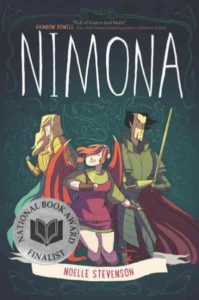
view/request
Ballister Blackheart, a kind-hearted supervillain, gains a new sidekick when Nimona, a shapeshifter in the (sometimes) shape of a young girl, simply insists. Nimona seems to be interested only in mischief, villainy and fun. Blackheart has little patience for her antics but they learn to get along and become a family of sorts, and a team that may just be capable of bringing down The Institution. Blackheart and Nimona each have their own rules, though, and their own complicated pasts.
Noelle Stevenson’s graphic novel, first released as a webcomic, is a delightful read. The artwork is inviting with simple expressive lines, and beautiful colorwork in a subdued palate. Nimona can be a mouse or a lion, a boy or a girl, a squirrel or a dragon. This makes for a very fun to read comic, as we learn to recognize Nimona in her many forms, and of course Nimona’s shape shifting comes in handy in the pair’s many schemes. The story is touching and humorous, though it’s the characters that keep you turning the pages. If you are anything like me you will finish wanting more.
Reviewed by Ben
Tagged: Fantasy
Foreigner: A Novel of First Contact
by C. J. Cherryh
[Book]
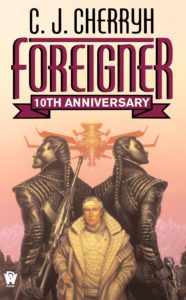
view/request
The subtitle of C. J. Cherryh’s novel Foreigner is “a Novel of First Contact”. The novel begins with a brief prelude in which a starship is flung off course and and its passengers and crew find refuge on a previously unknown world where their first encounter with the local inhabitants has a fairly promising start. This is not a typical first contact story, however, because the novel then jumps several centuries into the future, and we find that relations between the indigenous population and the foreigners are mired in misunderstandings and ignorance.
As it turns out, the indigenous Atevi and the foreign humans found they had a common interest in slowing down contact between their two peoples. After some disastrous misunderstandings a treaty is formed to limit human-Atevi contact. According to the treaty the humans are given an island on which to live, the Atevi have the rest of the world, and contact between the two species is channeled through a single human translator/diplomat known as the paidhi. This worked well; for generations humans and Atevi both prospered, and for generations of paidhi the job consisted of attending meetings and writing dictionaries. Foreigner tells the story of Bren Cameron, a young paidhi whose plans for a quiet life of linguistics and tedious but routine bureaucracy must be exchanged for intrigue, politics, and outright violence—and he doesn’t even know why. Cherryh’s narration alternates between Bren’s awkward interactions with his Atevi hosts, which increasingly involve attempted assassinations, espionage, and uncertain alliances, and his internal monologues as he tries to make sense of his increasingly incomprehensible situation. Suddenly, things are changing very rapidly. Bren is the only human with a chance of comprehending what the changes mean to the Atevi. Is Bren the world’s only hope at keeping peace?
Foreigner is the first novel in a long series (nineteen novels have been published so far) and is perfect for folks that like long character arcs, anthropological sci-fi, deliberate pacing, and complex relationships.
Reviewed by Ben
Tagged: Fiction, Science fiction
Spinning Silver
by Naomi Novik
[Book]
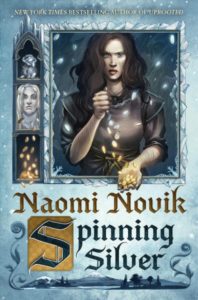
view/request
Spinning Silver is a fairy-tale inspired fantasy set in Lithvas, a fictional country with with elements of Lithuanian, Polish, and Russian history and culture. The kingdom is ruled by a tsar. The economy is largely agrarian with barley and wool playing an important role. Winters are harsh. With its combination of Eastern European culture, fairy-tale like magic, and modern sensibilities, Spinning Silver has much in common with Naomi Novik’s Uprooted, and folks who enjoyed Uprooted will enjoy Spinning Silver as well. That said, Spinning Silver is the darker and more complicated story, and much of that complexity and darkness comes from a simple fact: Miryem, the central character in the novel, and her family are Jews.
Though much of Spinning Silver is fantasy, the antisemitism that shapes the outlook of so many of its characters is not. Novik said in an interview with Paste magazine that “Spinning Silver is about my father’s family, and they were Lithuanian Jews who had to escape persecution”. Distrust is high and misunderstandings are common (Wanda, a farm girl, mistakes the family’s sabbath prayer for a magical spell), and Miryem and her family are always aware that their lives could be disrupted by anti-Jewish violence. And as moneylenders their role in the local economy is both welcome and despised.
Spinning Silver is about value and assessment, debts and promises, trades and bargains. Miryem’s strength comes ultimately from her recognition of her own worth and her insistence on not being undervalued. And Miryem, Wanda, and Irina, the three main women in the story, are all remarkable for their cool level-headedness and practical outlook. Whether trading in the market, bargaining with an otherworldly ice king, exorcising a demon, or deciding whether or not to accept the hand of suitor, these women stand up for themselves and make careful, calculated decisions. In Spinning Silver these well reasoned decisions and difficult compromises are celebrated and, at least in Miryem’s case, elevated to the point of high magic.
Spinning Silver is one of the most enjoyable books I have read this summer. If you enjoy a good fairy tale I highly recommend you give it a try.
Reviewed by Ben
Tagged: Fairy tales, Fantasy, Fiction, Women
Hunger: A Memoir of (My) Body
by Roxane Gay
[Book]
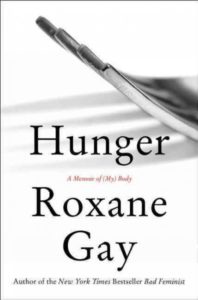
view/request
Roxane Gay’s memoir Hunger: A Memoir of (My) Body is startling. It is moving and important. It is hard to read and hard to put down.
In this memoir of her body Gay puts into words so much that would generally be left unsaid. Gay’s writing is clear and concise. It does not shy from the contradictions in life. It is both restrained and emotional. It is devastating. Gay tells us about her life. She was raped at the age of twelve. She is fat. She is scared. She is complex, intelligent, insightful, compassionate, and a brilliant writer. She lives a privileged life and recognizes her privilege. She is the subjected to great prejudice and discrimination. In Hunger she shares truths that must be incredibly difficult to share and she does so very well.
Gay’s book tells us much about her life, but it also tells us much about our culture, our country, our attitudes. We are not kind to fat bodies. We are not kind to women’s bodies. We are not kind to black bodies. We are not kind to ourselves. You probably already know this, but Gay’s book will still open your eyes. Her perspective is probably not one you have heard before.
On the back of the dust jacket Ann Patchett tells us why this book is important and I cannot improve on what she says. She writes:
“It turns out that when a wrenching past is confronted with wisdom and bravery, the outcome can be compassion and enlightenment—both for the reader who has lived through this kind of unimaginable pain and for the reader who knows nothing of it. Roxane Gay shows us how to be decent to ourselves and decent to one another. Hunger is an amazing achievement in more ways than I can count.”
Reviewed by Ben
Tagged: Memoir, Non-fiction, Trauma, Women
The Fifth Season
by N. K. Jemisin
[Book]
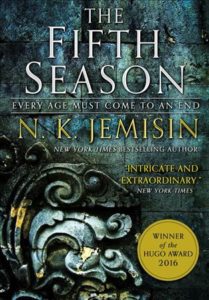
view/request
The Fifth Season is the first in The Broken Earth trilogy, a complex narrative work of fantasy that tells the tale of a world that may once have been like our own Earth, but has suffered from repeated environmental catastrophe’s, the “fifth seasons” of the book’s title. The world is frequently subjected to seismic stresses and acid rains and societal breakdowns. To survive,folks rely on the knowledge—and prejudice—passed down as “stone lore”.
The Fifth Season paints a detailed vision of a world with a rich but incomplete history full of deep prejudices and injustices, its own unique vocabulary, and a magical system that is almost scientific. It ends on a cliff-hanger, so you’ll want to read the whole series!
Reviewed by Ben
Tagged: Fantasy, Fiction, Science fiction
Autonomous
by Annalee Newitz
[Book]
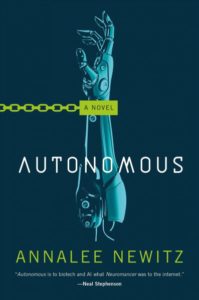
view/request
Imagine a future in which genetic engineering is commonplace, artificial intelligence has advanced to the point where machine consciousness is taken for granted, and robots, which are built from a mixture of electrical, mechanical, and biological components, are an accepted part of everyday life. Property is key in this world. Robots can be owned, and people too, but the most valuable property is information, and corporations will do nearly anything to defend their patents. The individual in this world, whether human or machine, has few rights and less power.
Annalee Newitz’s Autonomous is set in such a world. Jack is an anti-patent pirate, skilled at chemical and bio engineering and determined to make pharmaceuticals available to those who need them, but she is in trouble when she realizes the dangers inherent in a new highly addicting productivity drug. Meanwhile Paladin, an AI, and Eliasz, both employed by a military organization dedicated to protecting intellectual property, are on her trail.
Told from varied perspectives, including the perspective of a new Artificial Intelligence learning about the world, Autonomous is a moving and engaging novel. With great characters, adventure, sci-fi, philosophy, and romance, it has a lot to offer. I enjoyed this book enormously!
Content warning: drug use and abuse; some sexual content; some violence which can be graphic at times, including a disturbing description of a torture during an interrogation
Reviewed by Ben
Tagged: Fiction, Science fiction
A Catalog of Birds
by Laura Harrington
[Book]
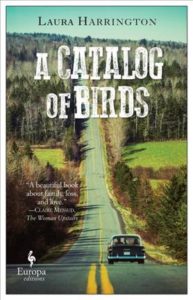
view/request
Laura Harrington’s A Catalog of Birds is a novel about a family in Geneva, NY and what happens when the youngest son, Billy, returns from Vietnam, a wounded veteran. It’s also about nature and listening, about trees and birds and lakes, about ambition, disappointment, loss and love. It is beautifully written and I would have happily continued to read about these people and this place had the book been twice as long, even though their story often brought me to tears.
Reviewed by Ben
Tagged: Fiction, Historical fiction, Literary fiction, Veterans
Carry On
by Rainbow Rowell
[Book]
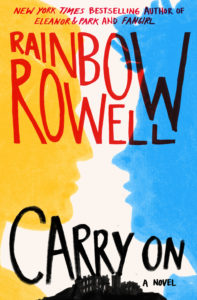
view/request
Rainbow Rowell’s Carry On reads like a compact and quirky alternative Harry Potter. The parallels are impossible to miss. Our protagonist had no knowledge of the magical world until he was discovered and brought to a magic school where he quickly makes friends and begins a series of fantastic adventures. We have characters who clearly have analogs in Harry, Hermione, Draco, Hagrid, and Voldemort, and there are more subtle references as well. Carry On is more than an homage, however. It is an engaging fantasy with good world building and a satisfying plot. Many aspects of the book simply seem better than they have to be, which is delightful. The story is told from a number of viewpoints, each of which satisfyingly reveals something different about the characters. (The everchanging dynamic between our protagonist Simon and his rival Baz is a driving force in the book, and the contrast between their individual perspectives is part of what makes the book work so well.) The world is well thought out with complex politics and an intriguing, novel, and entertaining magic system. And Carry On is compact—it is as if Rowling had decided to tell the entire Harry Potter story in a single Harry Potter and the Sorcerer’s Stone sized volume that concentrated mainly on Harry’s last year, only touchiching upon earlier adventures in brief flashbacks.
Reviewed by Ben
Tagged: Coming-of-age, England, Fantasy, Fiction, LGBTQ
The Dispossessed: A Novel
[Book]
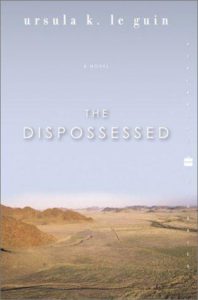
view/request
Shevek is born in a world created by anarchists. This world, a moon in fact, is home to a planned society in which the concept of property does not exist and the language has been designed to discourage selfish thought. The people there have very little contact with the world from whence they came—the capitalist planet of Urras. Shevek is a brilliant physicist whose groundbreaking work is too advanced to be understood by his colleagues. If he wishes to continue his research he must, therefore, visit Urras and work with the scientists there.
Le Guin’s writing is excellent. In telling the story of Shevek, of his research, and of his journey, she also subtly explores some very interesting ideas about culture, language, government, and psychology. This imaginative work, like most of Le Guin’s science fiction, stands alone, and if you have never read any Le Guin this would be an excellent place to start. And if you like it you will find that Le Guin has written many more excellent books set in the same universe.
Reviewed by Ben
Tagged: Dystopia, Fiction, Science fiction, Utopia
Lives Worth Living
[DVD]
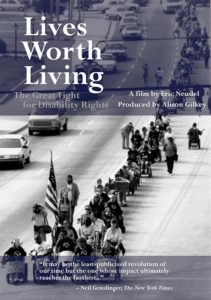
view/request
When I went to the Northampton Senior Center for a special Northampton Commission on Disability screening of Lives Worth Living I didn’t know anything about the film or its subject the disability rights movements. I was pleasantly surprised to find that the film was not just informative, but a well-crafted and incredibly moving introduction to the subject that left me eager to learn more.
At just 54 minutes in length, Lives Worth Living is too short to be more than an introduction to the story of disability rights (which it traces from the polio epidemics of the early twentieth century and the treatment of disabled veterans up to the passage of the Americans With Disabilities Act of 1990), but it makes excellent use of the time it has. We briefly learn about the discrimination and negative attitudes faced by the people with disabilities who were too often assumed to be without potential or worth. We briefly learn about the shocking maltreatment of people with mental disorders and about the Willowbrook State School and the abuses that occurred there and at similar institutions throughout the country. We learn about the Architectural Barriers Act of 1968, the Rehabilitation Act of 1973, and other early legislation, but more importantly we learn about the advocates who pushed to expand protections for the disabled, unifying diverse groups (associations for the blind, the physically handicapped, mental patients and others), and how disability rights became recognized as civil rights. And we learn about the protesters—the individuals who occupied buildings, locked themselves to bus shelters, and even crawled and pulled their way up the capitol steps to make their message heard.
Lives Worth Moving is a powerful film, well worth watching and relevant to us all. I cannot recommend it enough.
Reviewed by Ben
Tagged: Civil rights, Disability, Documentary, Film, History
Claire of the Sea Light
[Book]
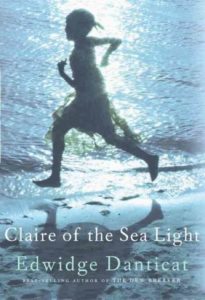
view/request
In Claire of the Sea Light, Edwidge Daticat tells a number of stories, each of which interconnects with and is enhanced by the others. The stories are all set in the fictional Haitian town of Ville Rose, a fishing community where fishing is no longer profitable, the lighthouse no longer possesses a lantern, the few wealthy residents worry that their homes will be washed away, and the town mayor is also the undertaker.
The protagonists of these stories are sympathetic, well meaning, good people, but life is not particularly good to them. Neither education nor wealth is enough to escape from the misfortunes of Ville Rose, and few are lucky enough to have either. There are many tragedies in these stories—deaths, crimes, and injustices—and yet I don’t think it is a book about sadness or tragedy. Instead it is about a place and the interconnections between the people there. It is about the connections between a radio announcer and her listeners, a teacher and his pupils, parents and children, and also about the inner lives of them all, and how each one effects the others. It is a beautiful book with stories worthy of contemplation, recollection, and rereading.
Reviewed by Ben
Tagged: Fiction, Haiti, Literary fiction
Crosstalk
by Connie Willis
[Book]
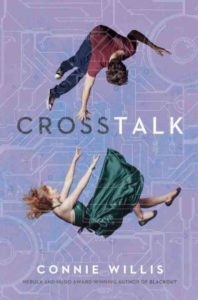
view/request
Crosstalk is a near-future science-fiction romance which explores our always-connected, always-on culture, and like so many of Connie Willis’s stories it is almost-but-not-quite too complicated, a bit neurotic, and wonderfully entertaining. The story centers on a couple of employees at a small smartphone company that is trying to outdo Apple, but one of them has a secret and fears that they might succeed all too well.
Connie Willis is great at witty dialogue, improbable situations, and fun, unexpected plots. She’s one of our favorite authors here at Forbes Library, and this, her newest offering, is a very fun read (even if it doesn’t have time travelling Oxford historians!)
Reviewed by Ben












